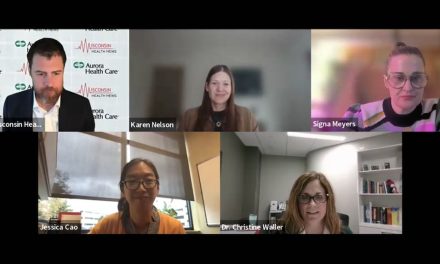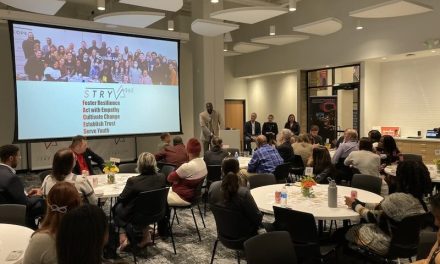
New Lisbon Avenue Health Center Opens
Facility expands access to health care for low-income residents
Local officials and supporters gathered today for a ribbon-cutting ceremony at Lisbon Avenue Health Center to mark a significant step in health care access for underserved Milwaukeeans.
The new 42,000-square-foot health center will do more than simply replace a smaller, inefficient century-old building. Located at 3522 West Lisbon Avenue, the center will bring a broader array of health care services to an additional 11,000 people who live in Washington Park and surrounding neighborhoods. Expanded access to primary care, women’s health services, dental care, laboratory and diagnostic radiology services and specialty care will be offered in a building with five times more space than the old one. On-site behavioral health services and a community health education center now also will be available.
“We’re deeply grateful to everyone who helped make this new building possible,” said Jenni Sevenich, chief executive officer of Progressive Community Health Centers. “We were bursting at the seams in the old building. With additional space and services at this location plus our Hillside Family Health Center on North 7th Street, we’ll be able to serve about 18,000 patients annually, more than double our previous capacity. That means having timely, appropriate care where they live instead of going to an emergency room in a non-emergency situation or not getting care at all.”
Among those on hand to celebrate the project’s completion were Mayor Tom Barrett; Congresswoman Gwen Moore; Froedtert & the Medical College of Wisconsin Froedtert Hospital President Cathy Buck; Regional Director, Region 5, US Department of Health and Human Services Kathleen Falk; State Senator Nakia Harris-Dodd; and Progressive Board member and patient Muneer Bahauddeen.
“The opening of this health center is a big step in ensuring that city residents have access to a comprehensive network of health care options,” said Mayor Barrett. “Those in Washington Park and the surrounding neighborhoods will now have improved access to quality primary care, specialty care and preventive services all in one place. We know that when barriers to access are eliminated, people are more likely to seek the services they need to be healthy. Healthy men, women and families lead to a healthier Milwaukee.”
Cathy Buck noted, “Froedtert’s partnership with Progressive began many years ago as we worked together to expand access to care in our community, and our commitment to them and to the Washington Park neighborhood extends well beyond the $2 million we donated to help build this wonderful new health center. Prevention and wellness are key to improving health, and we will continue to collaborate with Progressive to provide school health and wellness programs in addition to clinical services.”
According to Sevenich, the availability of health insurance through the Affordable Care Act and Medicaid expansion has created a wave of newly insured people, heightening the need for access to care.
“Having health insurance is a good thing, but it doesn’t automatically mean you have access to care,” said Sevenich. “We want to help close that gap.”
The $12.5 million cost of the new building was funded by a federal grant and local contributors including Froedtert Health, the Milwaukee Health Care Partnership, a City of Milwaukee Block Grant, the Greater Milwaukee Foundation, Elizabeth Elser Doolittle Trust and the Brewers Community Foundation, Inc.
*****
About Progressive Community Health Centers
Established in 1999, Progressive Community Health Centers (PCHC) exists to provide medical and dental services to primarily underserved and uninsured populations in Milwaukee’s central city. PCHC operates two federally qualified health centers at 3522 W. Lisbon Avenue and 1452 N. 7th Street. Services include family medicine, internal medicine, women’s health, dental, case management and financial counseling/benefits enrollment. In 2013, PCHC served roughly 7,000 patients, nearly 70 percent of whom lived below 200% of the federal poverty level.





